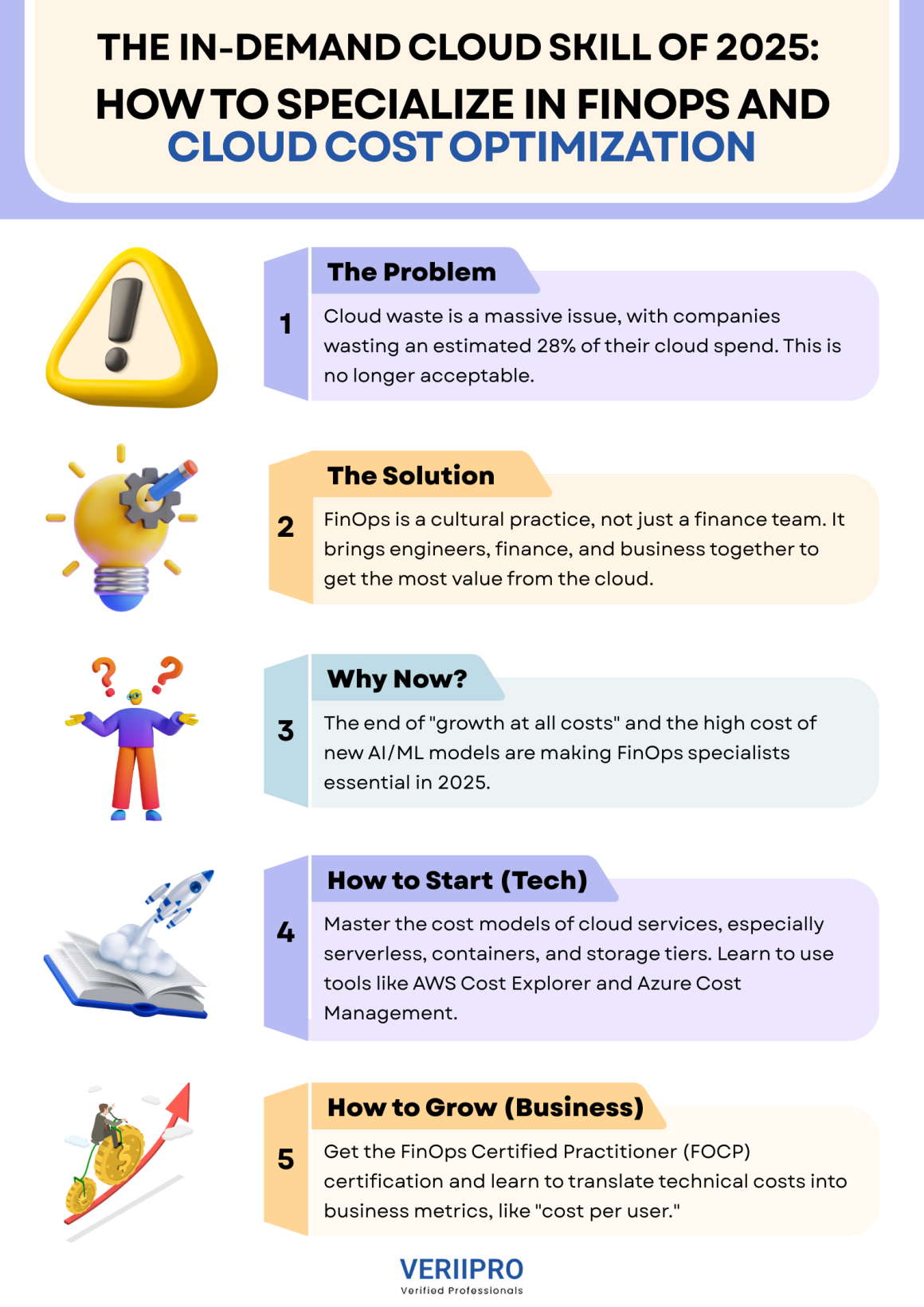The In-Demand Cloud Skill of 2025: How to Specialize in FinOps and Cloud Cost Optimization
Let’s be honest: in the last ten years, “move to the cloud” was a one-way street. We migrated, built, and scaled at lightning speed, often with a “figure out the cost later” mentality. Well, “later” is here.
We’ve all heard the horror stories-or lived them. The engineering team spins up a new environment for a “quick test,” forgets to turn it off, and suddenly the monthly AWS bill has an extra zero. The data team experiments with a new AI model, and the cost of GPU instances blows up the entire quarter’s budget.
This isn’t a simple mistake; it’s a systemic problem. A 2023 report from Flexera estimated that organizations waste around 28% of their total cloud spend. In an era of economic tightening and a push for profitability, that 28% has moved from an “oops” to a “fireable offense.”
This is precisely why FinOps has exploded from a niche buzzword into one of the most in-demand and fastest-growing specializations in technology. It’s the critical skill that companies are desperately seeking to tame the cloud beast, and it’s poised to be the hottest ticket for 2025.

What Is FinOps? (Hint: It’s Not Just “Finance”)
The biggest misconception is that FinOps is just the finance department telling engineers to “spend less.” This is completely wrong.
The FinOps Foundation center of this practice-defines it as a cultural practice that brings financial accountability to the variable spending model of the cloud. In simple terms, it’s a practice that gets engineers, finance, and product managers to speak the same language.
It’s not about slashing budgets. It’s about maximizing the business value of every dollar spent. It’s about asking, “Are we getting the most revenue, performance, or innovation for this cost?” This shift from “cost-cutting” to “value-engineering” is what makes FinOps specialists so powerful. They aren’t just cloud janitors; they are strategic partners.
Why 2025 Is the Year of the FinOps Specialist
If you’re an engineer, a cloud architect, or a data analyst, this is your signal. The demand for FinOps skills is skyrocketing for three main reasons:
- The End of “Growth at All Costs”: The tech economy has matured. Investors and boards no longer reward growth if it’s unprofitable. They want efficiency. The person who can deliver the same performance for 30% less cost is now the most valuable in the room.
- The Generative AI Explosion: Training and running large language models (LLMs) is insanely expensive. As Gartner points out, the cost of GenAI is a major concern for 80% of organizations. Companies are diving headfirst into AI and need experts who can stop it from becoming a financial black hole.
- The Cloud Is Now “Legacy”: Most companies have been in the cloud for years. Their infrastructure is sprawling, complex, and full of legacy decisions. They don’t need “migration” experts anymore; they need “optimization” and “governance” experts.
A FinOps specialist is the bridge between the technical and the financial world. They have the power to directly impact a company’s bottom line, making them highly visible and indispensable.
How to Build Your FinOps Specialization
This isn’t a role you can just get a single certification for and be done. It’s a hybrid skill set. You need to be part engineer, part financial analyst, and part business strategist. Here’s your roadmap.
1. Become a “Cost-Aware” Architect. You cannot optimize what you don’t understand. First, you must master the cloud services themselves-not just how they work, but how they are billed.
- Go Beyond Virtual Machines: Learn the cost models for serverless (Lambda/Functions), containers (Kubernetes/EKS), and managed database services (RDS/Aurora).
- Master Storage Tiers: Do you know the cost difference between AWS S3 Standard and S3 Glacier Deep Archive? Knowing when to move data to cheaper storage is a core FinOps skill.
- Understand Purchasing Options: Master the use of Reserved Instances (RIs), Savings Plans, and Spot Instances. Using Spot Instances for batch workloads can save up to 90%, but you have to know how to implement them.
2. Master the Cloud Cost Tools. Every major cloud provider has a suite of tools that are the foundation of FinOps. You must live in these dashboards.
- AWS: AWS Cost Explorer, AWS Budgets, and AWS Cost and Usage Report (CUR).
- Azure: Microsoft Cost Management and Azure Advisor.
- GCP: Google Cloud Billing and Cost Management tools. These tools are how you gain visibility-the first and most important step.
3. Learn to Speak “Business” This is what separates a good engineer from a great FinOps leader. You need to translate technical costs into business metrics.
- Learn “Unit Economics”: Stop saying “The EKS cluster costs $50,000 a month.” Start saying, “Our cost per-active-user is $0.15” or “The cost per-transaction for this feature is $0.02.”
- Build Dashboards: Learn to build simple, automated dashboards (in tools like Tableau, Power BI, or even CloudWatch Dashboards) that show teams their own spending in real-time. This drives accountability.
4. Get the Key Certification. While experience is king, the industry has standardized around one key certification: the FinOps Certified Practitioner (FOCP) from the FinOps Foundation. It’s an open-source, vendor-neutral certification that teaches you the “who, what, and why” of FinOps. It proves you understand the principles, the terminology, and the lifecycle (Inform, Optimize, Operate).
This isn’t a technical deep dive, but it’s the “HR filter” and the common language that everyone in the space is adopting.
The Future-Proof Career
Becoming a FinOps specialist is one of the smartest career moves you can make in tech today. You are no longer just “the cloud person”; you are the person who ensures the cloud is a profitable, sustainable engine for the entire business.
It’s a role that combines deep technical knowledge with high-level business strategy. It’s challenging, it’s visible, and in 2025, it will be one of the most in-demand and well-compensated roles in the industry.
Looking Forward
Looking for opportunities in FinOps and Cloud Management? VeriiPro is here to help! As companies get serious about cloud efficiency, the demand for specialists who can bridge the gap between engineering and finance has exploded. VeriiPro specializes in connecting talented FinOps and cloud professionals with innovative companies that are building fiscally responsible and efficient cloud strategies. With our deep industry network, we have the resources to help you find a role where you can make a direct impact on the bottom line.








